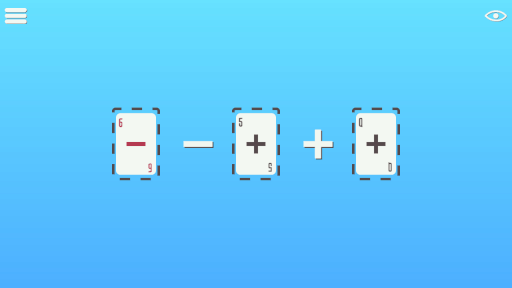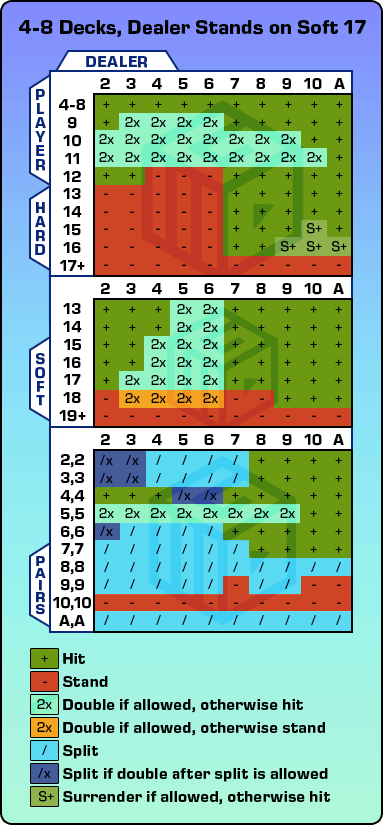Blackjack Math
Blackjack writers tell us that the average hand of blackjack is 2.7 cards, meaning more people take three cards than two. Since there are just 5 “small” cards for every 13 “big” cards in a 52-card deck, we get an average of 1.03 “small” cards for every hand of blackjack played–about one card per hand, regardless of how many people.
The mathematics of blackjack: Probabilities We first present the probabilities attached to card dealing and initial predictions. In making this calculus, circumstantial information such as fraudulent dealing is not taken into account (as in all situations corresponding to card games). DARPA’s Blackjack program aims to develop and demonstrate the critical elements for a global high-speed network in low Earth orbit (LEO) that provides the Department of Defense with highly connected, resilient, and persistent coverage.
Math isn’t something that most gamblers want to think about when they’re gambling, but it can help in so many ways. Blackjack is a casino game that shows exactly how much knowing a little bit of math can improve results.
In fact, if you embrace the arithmetic behind the game, you can actually win more than you lose when you play blackjack.
Here are seven mathematical facts that every blackjack player needs to know.
1 – Odds Based on a Specific Set of Cards

The best thing about playing blackjack for real money is that everything that happens when you play is controlled by a specific set of cards. Most blackjack players don’t think about the game this way, but there are only 52 cards in a deck.
Even if the game is using six or eight decks of cards, there are still only 52 possible cards. And the base game of blackjack really only uses 13 sets of cards. This is because the jack of diamonds and jack of spades are the same. And because there are 13 ranks of cards, there are only 13 sets of cards that matter, no matter how many decks are being used.
This might not seem like it matters much, but once you understand why this is important and how you can use it, it helps you make smart decisions at the blackjack table.
If you have a hard 16 and the dealer is showing a six, do you know what the correct play is? You’re going to learn more about strategy cards in a different section. But if you don’t have a strategy card, you can get a good idea of the correct play using the fact that there are only 13 possible card ranks in the deck.

If you hit and get any card of six through king, you bust. If you bust, it doesn’t matter what happens to the dealer hand. This means that eight cards will make you bust, and only five help your hand.
You also know that the dealer has one of the 13 cards as his or her face down card. If the dealer has a 10 through king, they have a hard 16 and have the same chance to bust as you. You also know that if they have a six through nine, they have to hit and have a decent chance to bust. This means that eight out of 13 cards are bad for the dealer.
If these are the only things you know, it’s clear that the best play is to stand. This is why a specific set of cards is valuable to you when you play blackjack. You can use this information every time you play.
2 – Splitting Eights
Now, you can see some specific ways to use the information you learned about in the first section. Consider your hand if you start with a pair of eights.
You have to place another wager, but it’s worth it to avoid starting with a hard 16. You receive another card on each of your eights.
Here’s a list of cards that help you a great deal on an eight. A two, three, nine, 10, jack, queen, king, and ace all put you in a good spot. This is eight out of 13 cards. Even a four through seven is better than a hard 16. This means that, by splitting, you can’t possibly be in a worse spot than playing it as a hard hand.
If you get another eight, you can split again.
3 – Splitting Aces
When you start with a pair of aces, you have either two or 12. Neither of these is a good starting total. But when you split aces, you have an opportunity to improve by a large amount.
Any of the cards 10 through king give you a total of 21. A six through nine all give you a soft 17 or better. The only cards that don’t help you much are two through five, and you still have a soft hand with each of these. You still have a chance to win. This is another situation where eight out of the 13 possibilities improve your hand quite a bit.
You can see how the mathematics of blackjack help you improve your chances to win by the examples in these first three sections.
4 – Doubling Down
The usefulness of mathematics in blackjack doesn’t stop with the examples above. It’s also useful in situations where you need to determine how to get more money in play when you have a good chance to win.
When you have a hard 11, 10, or nine, it’s often more profitable to double down than to hit. When you double down, you get twice as much money in play on the hand, and you receive one more card to complete your hand.
With an 11, you should double down every time except when the dealer has an ace showing. With a hard 10, doubling down is the most profitable play except when the dealer has an ace or 10 point card showing. And with a nine, you should double down when the dealer shows a three through six.
A few soft hands also are more profitable to double down with, and you can learn more about these hands by using a strategy card. You can learn more about strategy cards in the next section.
5 – Casino Strategy Cards
Math Behind Blackjack
Now that you see how valuable it is to use math when gambling, you might be wondering if you need to do all of the math yourself. I’m going to put your mind at ease. Someone else has already done all the blackjack math for you and put it in an easy-to-use strategy card.
You can get a strategy card and use it every time you play blackjack. The card has all of the best possible plays, so you simply follow the card on every hand. It covers hard hands, pairs, and soft hands.
6 – Counting Cards
Even if you use a strategy card, you still are fighting a house edge. This means that you’re losing money playing blackjack, even though you’re playing with a small house edge.

But you can use math to help you turn this around and get a small edge against the casino. The way to do this is to use card counting.
If you play blackjack, you should learn more about counting cards. It’s not as hard as you probably think, and once you learn how to use proper card counting systems, you can benefit every time you play.

7 – Sizing Your Bets
Math is also helpful when it comes to figuring out how much you need to bet when you play blackjack. And it’s actually pretty simple to figure this out.

When you play blackjack and the casino has an edge, you need to bet the lowest amount possible. This means that every time you play blackjack and aren’t counting cards, you need to make the table’s minimum wager.
Even when you’re using a strategy card, the casino has an edge. It isn’t a big edge, but it’s still an edge. This means that the bigger your bets are, the more you lose.
Depending on the size of your bankroll, you should bet as much as possible when you have an edge. In real life, it’s hard to always bet the least and the most possible depending on the situation. But you’re going to learn how to do this as you learn more about counting cards.
Conclusion
The power of blackjack math starts with the 13 ranks of cards in the deck. Once you understand how you can use this knowledge, your results are going to improve right away.
Use the math behind a blackjack strategy card to get started, then learn how to count cards. If you practice long enough, you can learn how to get an edge every time you play.
This blackjack calculator will help teach you the correct play to make for every scenario possible. Our advanced algorithm allows you to customize different table rules so you can make the best informed decision to beat the house.
It will calculate the best possible option depending on the criteria by telling you the best statistical play: Whether to Hit, Stand, Surrender, Double or Split.
Math Of Blackjack
How to use this blackjack calculator
- Click to choose the dealer’s upcard
- Click on your first and second cards
- Click on calculate
- Click on reset to start over
- Click on clear to reset only your cards
Once you’ve practiced long enough with our calculator, move on to the next step of how to count cards using the hi-lo method so you can take your new found skills and play blackjack for real money.
Why is this the best blackjack calculator?
After looking around at other blackjack sites, we saw how complicated their blackjack calculators were and outdated they looked. If you’re a beginner, you’ll most likely get confused and never want to try again. So we made the user interface easy to follow and gave it a modern look.
Blackjack Probability Math
What is the house edge in blackjack?
Blackjack Methuselah Hunter Youtube
The casino has a house edge of 8% against players. By incorporating disciplined strategy, you can lower this down to as little as 0.5%, depending on what the table rules are. This is done by utilizing proper techniques when doubling down and splitting at the right moments.
Now that you understand blackjack odds and the correct play, it’s now time for you to play online blackjack at our top online casinos.